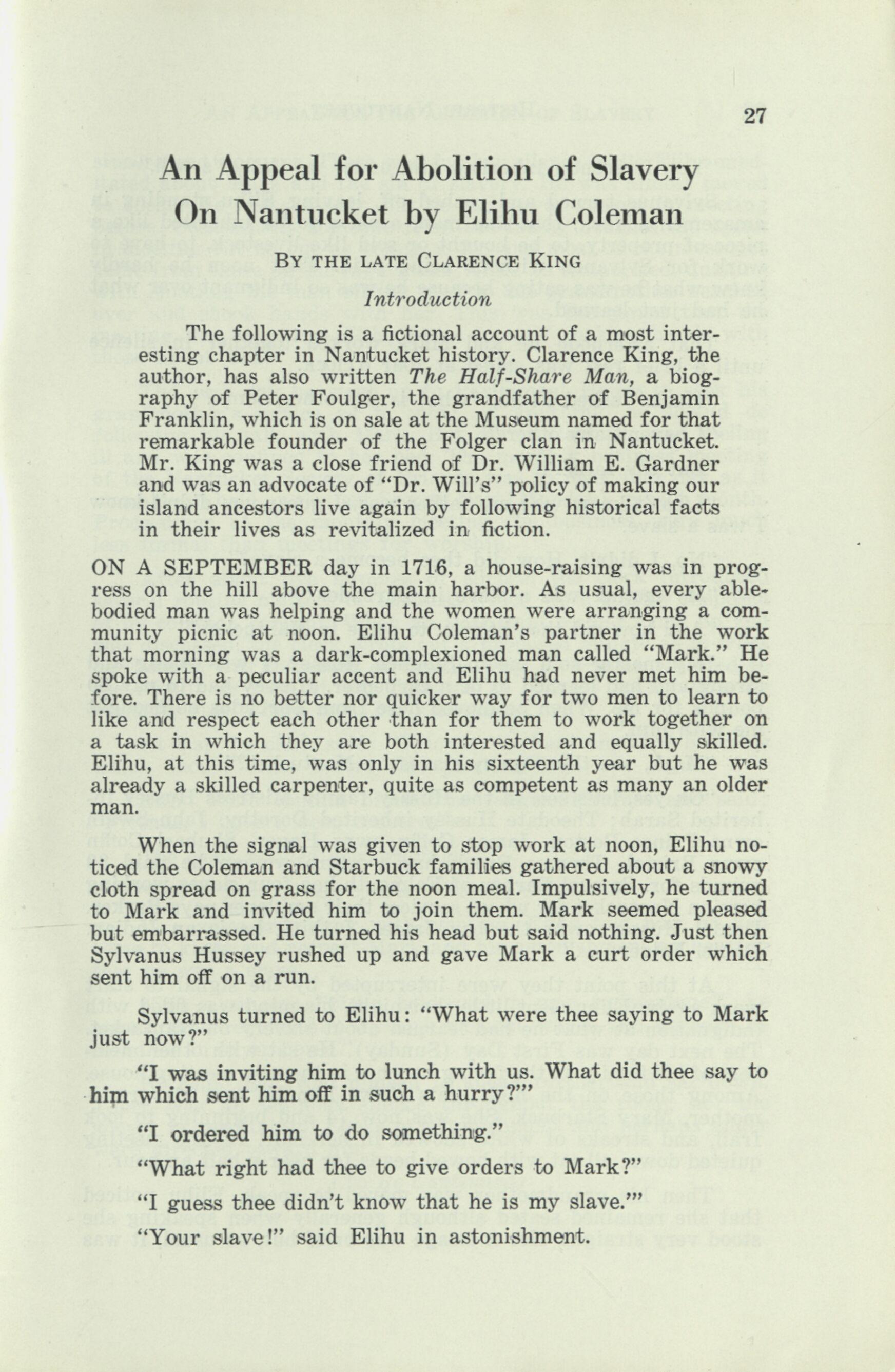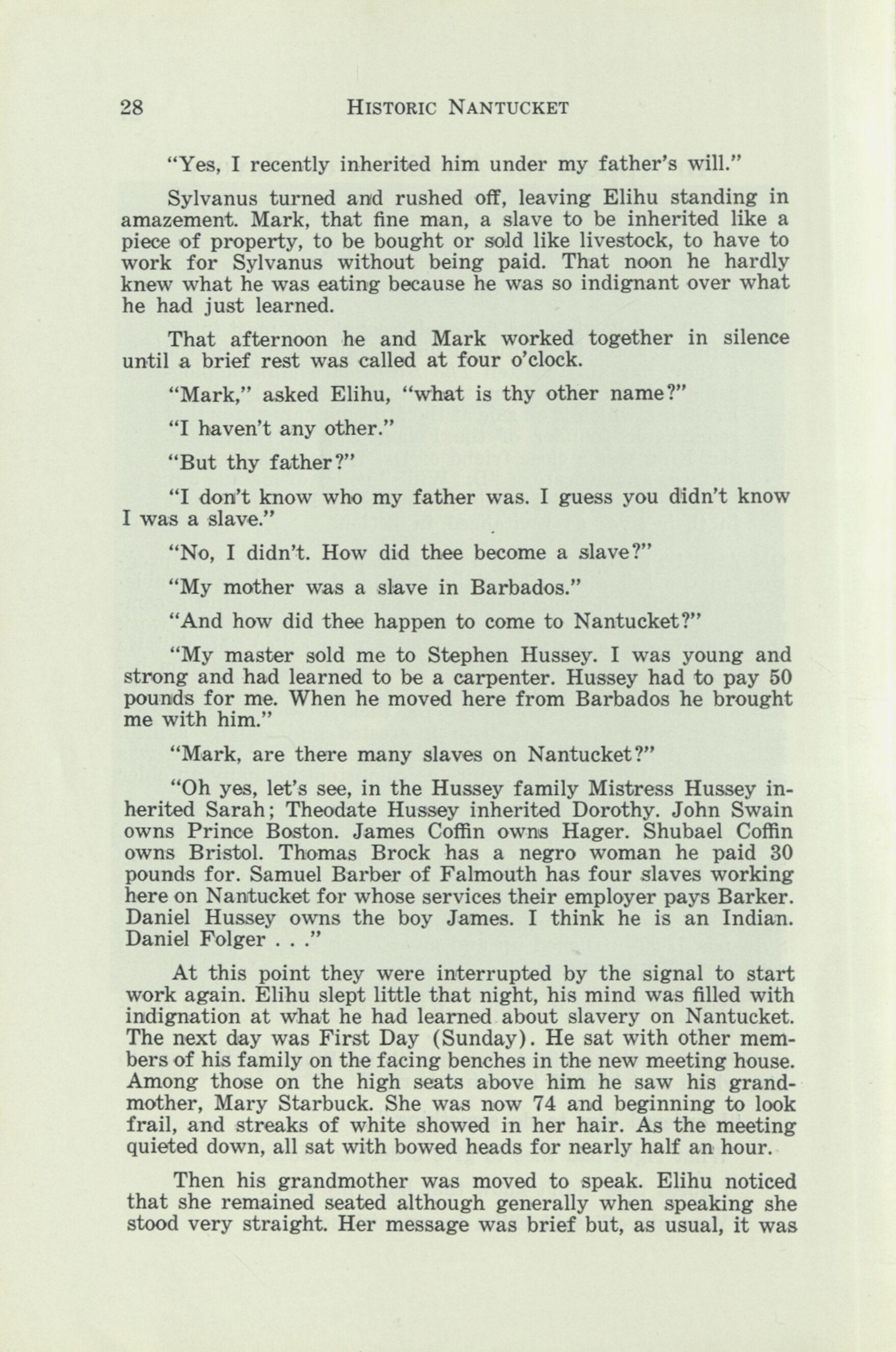
6 minute read
An Appeal for Abolition of Slavery on Nantucket
27
An Appeal for Abolition of Slavery On Nantucket by Elihu Coleman
BY THE LATE CLARENCE KING
Introduction
The following is a fictional account of a most interesting chapter in Nantucket history. Clarence King, the author, has also written The Half-Share Man, a biography of Peter Foulger, the grandfather of Benjamin Franklin, which is on sale at the Museum named for that remarkable founder of the Folger clan in Nantucket. Mr. King was a close friend of Dr. William E. Gardner and was an advocate of "Dr. Will's" policy of making our island ancestors live again by following historical facts in their lives as revitalized in fiction.
ON A SEPTEMBER day in 1716, a house-raising was in progress on the hill above the main harbor. As usual, every ablebodied man was helping and the women were arranging a community picnic at noon. Elihu Coleman's partner in the work that morning was a dark-complexioned man called "Mark." He spoke with a peculiar accent and Elihu had never met him before. There is no better nor quicker way for two men to learn to like and respect each other than for them to work together on a task in which they are both interested and equally skilled. Elihu, at this time, was only in his sixteenth year but he was already a skilled carpenter, quite as competent as many an older man.
When the signal was given to stop work at noon, Elihu noticed the Coleman and Starbuck families gathered about a snowy cloth spread on grass for the noon meal. Impulsively, he turned to Mark and invited him to join them. Mark seemed pleased but embarrassed. He turned his head but said nothing. Just then Sylvanus Hussey rushed up and gave Mark a curt order which sent him off on a run.
Sylvanus turned to Elihu: "What were thee saying to Mark just now?" "I was inviting him to lunch with us. What did thee say to him which sent him off in such a hurry?"' "I ordered him to do something." "What right had thee to give orders to Mark?" "I guess thee didn't know that he is my slave.'" "Your slave!" said Elihu in astonishment.
28
HISTORIC NANTUCKET
"Yes, I recently inherited him under my father's will."
Sylvanus turned and rushed off, leaving Elihu standing in amazement. Mark, that fine man, a slave to be inherited like a piece of property, to be bought or sold like livestock, to have to work for Sylvanus without being paid. That noon he hardly knew what he was eating because he was so indignant over what he had just learned.
That afternoon he and Mark worked together in silence until a brief rest was called at four o'clock. "Mark," asked Elihu, "what is thy other name?" "I haven't any other." "But thy father?" "I don't know who my father was. I guess you didn't know I was a slave." "No, I didn't. How did thee become a slave?" "My mother was a slave in Barbados." "And how did thee happen to come to Nantucket?" "My master sold me to Stephen Hussey. I was young and strong and had learned to be a carpenter. Hussey had to pay 50 pounds for me. When he moved here from Barbados he brought me with him." "Mark, are there many slaves on Nantucket?" "Oh yes, let's see, in the Hussey family Mistress Hussey inherited Sarah; Theodate Hussey inherited Dorothy. John Swain owns Prince Boston. James Coffin owns Hager. Shubael Coffin owns Bristol. Thomas Brock has a negro woman he paid 30 pounds for. Samuel Barber of Falmouth has four slaves working here on Nantucket for whose services their employer pays Barker. Daniel Hussey owns the boy James. I think he is an Indian. Daniel Folger . . ."
At this point they were interrupted by the signal to start work again. Elihu slept little that night, his mind was filled with indignation at what he had learned about slavery on Nantucket. The next day was First Day (Sunday). He sat with other members of his family on the facing benches in the new meeting house. Among those on the high seats above him he saw his grandmother, Mary Starbuck. She was now 74 and beginning to look frail, and streaks of white showed in her hair. As the meeting quieted down, all sat with bowed heads for nearly half an hour.
Then his grandmother was moved to speak. Elihu noticed that she remained seated although generally when speaking she stood very straight. Her message was brief but, as usual, it was

AN APPEAL FOR THE ABOLITION OF SLAVERY 29
sincere and eloquent. There was further silence while Elihu meditated about Mark and the sin of slavery. He was almost moved to speak. He felt strongly, but he had never spoken in meeting before. Occasionally someone from the facing benches did speak in meeting but no one as young as he, and most of the messages came from those on the high seats. While he temporized, quaking with emotion, the man sitting next to his grandmother reached over and shook hands with her. This was the signal that the meeting was over, and Elihu found himself shaking hands with those about him.
The next day he went up to Parliament House to seek his grandmother's advice as to what, if anything, he should do following his talk with Mark. But Mary Starbuck was feeling ill and was confined to her bed. The monthly business meeting of the Nantucket Society of Friends was to meet that day as it was always held on the last Second Day (Monday) in each month. Proceedings at the monthly meeting for business were much less formal than meetings for worship.
After about five minutes of silence, the clerk introduced several routine matters of business which were quickly disposed of by common consent. When an important matter came up and was discussed, the clerk wrote out a proposed minute as to what he thought was the sense of the meeting. If anyone objected to the minute as read, it was defeated as Friends do not vote by majority rule. There must be "consensus."
At last the clerk said: "Friends, is there any new business which should come before this meeting?"
Elihu could contain himself no longer. He rose and said: "Friends, I have a deep concern."
The clerk nodded encouragingly: "Let us hear of thy concern, Friend Coleman."
In a voice trembling with emotion, Elihu told how he had come to know and respect Mark and his astonishment on hearing that he was a slave. "Can a sincere Friend hold such a man in bondage?" he asked, "and require him to work without wages and perhaps be sold like an ox or horse?"

i
He could not trust himself to speak further and sat down. There was an ominous silence throughout the room, not the silence of meditation. Looks of astonishment and perhaps anger were directed toward him.










